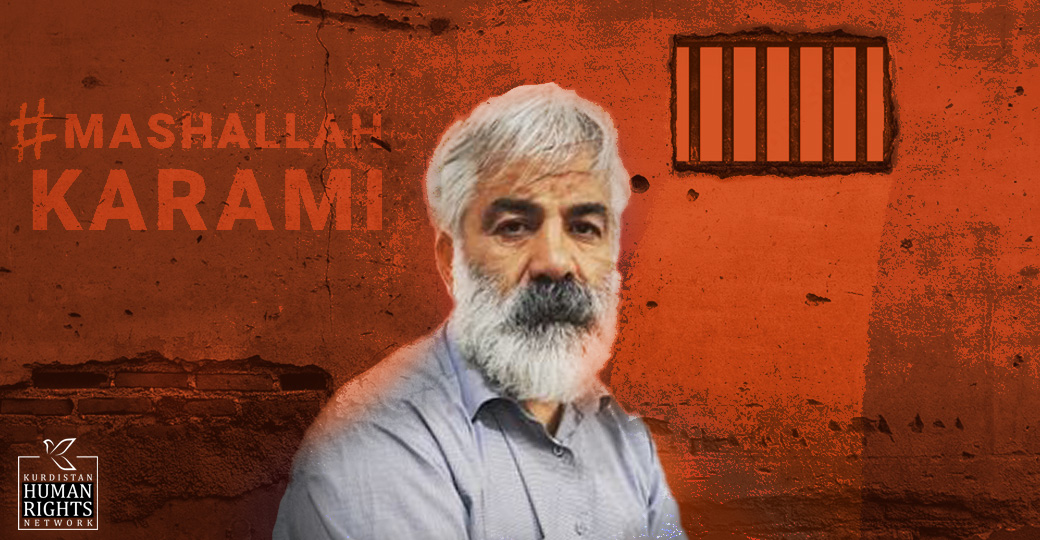Mashallah Karami is the father of Mohammad Mehdi Karami, a Kurdish political prisoner who was executed during the anti-government uprising of Women, Life, Freedom.
Mohammad Mehdi Karami, a Kurdish protester from Bijar, Kurdistan Province, was arrested during the Women, Life, Freedom uprising in Karaj, Alborz Province, and sentenced to death in the case of the “murder of Basij member Rouhollah Ajamian”. Karami and his co-defendant Mohammad Hosseini were executed on 7 January 2023.
Arrest
Mashallah Karami was arrested by security forces at his home in Karaj on 22 August 2023 and taken to the Ministry of Intelligence detention centre in the city.
During the arrest, the security forces searched the house and confiscated several personal belongings of the family, including mobile phones.
Security and judicial authorities also froze the bank accounts of the family members and forced Mohammad Mehdi Karami’s mother and brother to leave their home.
Mashallah Karami was transferred to Karaj Central Penitentiary on 28 October 2023.
Judicial Process
On 23 April 2024, a court session was held on charges of “propaganda against the state” and “assembly and collusion against national security” in Branch Two of the Islamic Revolutionary Court of Karaj.
In June 2024, he was sentenced to six years in prison, of which five years is enforceable under the Law on Consolidation of Sentences, and confiscation of assets that had been collected from public donations.
In another case, Branch 102 of the Criminal Court Two of Nazarabad, Alborz Province, sentenced him on 15 August 2024 to 14 months’ imprisonment on charges of “acquiring wealth through illegitimate means” and seven years and eight months for “involvement in money laundering.”
The court also sentenced him to pay a fine of 9.2 billion rials (nearly 18,500 USD) and confiscated his assets.
Current Status
Karami is currently being held in Karaj Central Penitentiary.
Notes:
1. Women, Life, Freedom Uprising: Jina Amini (Mahsa Amini), a 21-year-old Kurdish woman from Saqqez, Kurdistan Province, was arrested on a street in Tehran on 13 September 2022 by the morality police because of the way she was dressed. Shortly after her arrest, she was transferred to Kasra Hospital in Tehran with head injuries and symptoms of brain death, and passed away three days later on 16 September 2022. The government’s killing of Jina sparked unprecedented anti-government protests, which began with a large turnout at her funeral at Aichi Cemetery in Saqqez and quickly spread to many cities across Iran. These widespread protests against the Islamic Republic of Iran, which lasted for several months, resulted in at least 527 protesters being killed and thousands injured and arrested. The protests are known for their central slogan of “Women, Life, Freedom” (Kurdish: Jin, Jiyan, Azadi).
2. Article 500 of the Islamic Penal Code: “Anyone who engages in propaganda activities against the Islamic Republic of Iran or in favour of groups and organisations opposing the state, in any manner, shall be sentenced to imprisonment for a period of three months to one year.”
3. Article 610 of the Islamic Penal Code: “If two or more individuals gather and conspire to commit crimes against the internal or external security of the country or to facilitate the means for committing such crimes, they shall be sentenced to two to five years’ imprisonment, unless they are considered mohareb (those who commit enmity against God).”
4. Article 134 of the Islamic Penal Code: “In the case of multiple crimes, only the most severe punishment mentioned in the verdict is enforceable, and the other punishments are not considered unless the most severe punishment is reduced or converted for a legal reason, such as the private plaintiff’s withdrawal of his complaint, the annulment of the legal punishment, or the passage of time, in which case the next most severe punishment will be implemented.”









